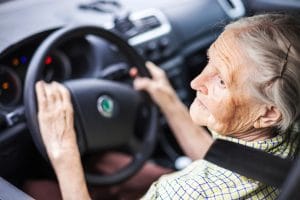What Is the Risk to Older Drivers on the Road?
 We all want our roads to be as safe as possible – not only for ourselves, but for our teenaged children just learning to drive, our school buses, and also our elderly loved ones. Today’s older population is doing better health-wise than previous generations, so they are driving well into their seventies and eighties.
We all want our roads to be as safe as possible – not only for ourselves, but for our teenaged children just learning to drive, our school buses, and also our elderly loved ones. Today’s older population is doing better health-wise than previous generations, so they are driving well into their seventies and eighties.
As there are more elderly people on the road thanks to improvements to medicine and health care, one would think that there would be more accidents involving the older generation. It turns out that this is not the case. A study done by the Insurance Institute for Highway Safety (IIHS) found that older drivers are less likely to be involved in a fatal crash than middle-aged drivers. The reason for this, per The New York Times, is that older drivers tend to be safer drivers. “Older adults benefit from years of driving experience that usually translates into better risk assessment and the ability to navigate challenges,” The New York Times explains. “Compared to young drivers, they are less likely to drink and drive, speed, ignore road signs, drive in bad weather and drive at night.”
So the question remains: if elderly drivers are involved in fewer accidents, why are they at greater risk of dying in a car crash? There are two primary reasons. First, despite being less likely to be involved in crashes, the elderly are also less likely to survive any crash they do have. Second, older drivers tend to have older cars, and the lack of safety technology makes these drivers more vulnerable.
How does age make a driver more vulnerable in a car accident?
New studies by IIHS show that people over the age of 70 are far more likely to die in auto accidents because of the frailness of their bodies, explaining: “Drivers 75 and older are about 4 times as likely to die as middle-aged drivers when they’re involved in a side-impact crash and about 3 times as likely to die in a frontal crash.”
The fact is that bodies become more vulnerable to harm over time. Bones can become more brittle, and muscle atrophy is more common, which means the effect of even a relatively minor collision may be more catastrophic. Conditions like arthritis can decrease flexibility and dexterity – two skills needed by drivers under the best of circumstances, but especially right before a crash – which can also increase the chance of severe injury. Wounds take longer to heal, too, according to Harvard Health, plus open wounds increase the chance of infection. In short, older bodies heal more slowly, and a minor injury for a younger person can be a serious one for an elderly person. A serious injury, therefore, may be more likely to become a fatal one for an older driver.
Why do older vehicles make elderly drivers more vulnerable?
It is not only the frailty that comes with aging that increases the death rate for older drivers who are involved in a crash. The cars that our elders are driving are aging, too. Studies show that drivers who are 70 or older drive smaller, older cars that do not have the same safety features as new cars, including such advances as driver-side, head-protecting airbags and electronic stability control (ESC). Without these safety features, the driver becomes far more susceptible to fatal crashes. The trend of having smaller cars also lends itself to the fatality increase among older drivers, per IIHS, “since the occupants of smaller vehicles are exposed to greater forces in collisions with larger ones.”
While price is a significant factor for the type of vehicle a person purchases, for elderly Americans who often live on a fixed income, cost is often the deciding factor when buying a vehicle. Another factor that adds to the fatalities of older people in car crashes is that when picking out a vehicle, the older generation simply does not look at or pay much attention or care to the safety ratings of vehicles. IIHS explains.
What can I do to protect my elderly loved one?
Knowing the information from these new studies, how can we best serve our elderly community? A good start would be to go with our loved ones when they are choosing a new vehicle, and help them understand the importance of a car’s safety rating. Talking about the safety features and how it could benefit them may be the key to keeping them safe. If you have a new vehicle with certain safety features, taking them for a few rides and showing them how the features help you while driving may be more effective than simply giving them statistics.
We must also think about whether our loved ones should still be driving. This is a delicate decision but speaking to a doctor may help your family broach the subject with your elderly relative. If your loved one has mobility issues, or vision problems, it may be time to take the keys.
Thankfully, medical advancements are helping our loved ones to live longer, fuller lives. As old challenges disappear, new ones arise, and we have to adapt. If your parent, spouse, or loved one has been in a car accident, it is best to find an experienced lawyer. Contact the car accident attorneys at Harris Lowry Manton LLP today. Call our Atlanta office at 404-998-8847 or our Savannah office at 912-417-3774, or use our contact form to schedule a free consultation.
One of the nation’s top trial attorneys, Jeff Harris is an award-winning litigator who handles high-profile, complex cases across a wide variety of practice areas. He excels at securing justice for clients who have been seriously injured or killed, holding responsible parties accountable for their actions as well as their negligence.
Read more about Jeffrey R. Harris here.
